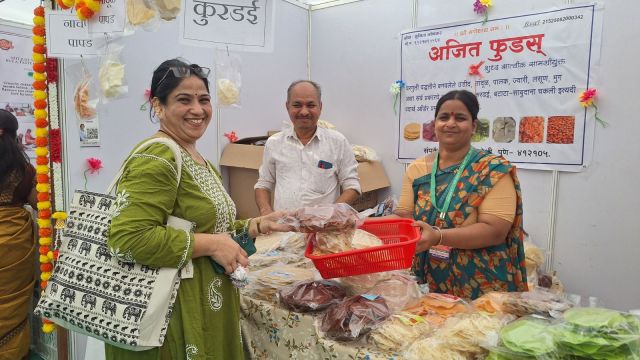Imparting financial literacy, branding skills, this Maharashtra foundation helps rural women entrepreneurs shine
Founded in 1996, the Mann Deshi Foundation works for the economic empowerment of rural women. Since 2006, it has reached 1 million women through various initiatives.
 From a reserved Moshi girl to a confident entrepreneur interacting with customers in Mumbai, Sunita Lonkar has come a long way. (Express Image)
From a reserved Moshi girl to a confident entrepreneur interacting with customers in Mumbai, Sunita Lonkar has come a long way. (Express Image)Sunita Lonkar grew up as an introvert in the small village of Moshi in Pune, and had to discontinue her education after Class 12 due to her family’s financial constraints. Her parents married her off at a young age after which she moved to Pimpri-Chinchwad with her husband and started a small business selling cloth bags.
However, her earnings weren’t steady. In 2019, she started a home-based papad business that earned her just Rs 2,000 a month. Aiming to expand her business, two years ago she joined the Rural Chamber of Commerce for Women (RCCW) programme run by the charitable trust Mann Deshi Foundation.
This year, she participated in the Mann Deshi Mumbai Mahotsav from February 5-9, where she carried out sales worth nearly Rs 1,05,000. From a reserved Moshi girl to a confident entrepreneur interacting with customers in Mumbai, Lonkar has come a long way.
She was among 180 women entrepreneurs and beneficiaries who participated in the Mahotsav which showcased handmade goods, farm products, food as well as traditional arts and crafts. While 21 of the participants were from Pune, the rest were from other branches of Mann Deshi in Satara, Solapur, Sangola, Nashik, Latur, Lonand, Dahiwadi, Vaduj, Mhaswad, Kolhapur, Pimpri-Chinchwad, and Kamothe.
The Mann Deshi Foundation was founded by Chetna Sinha in 1996 for the economic empowerment of rural women in India. Since 2006, it has reached 1 million women through various initiatives that impart financial and digital literacy. The Mumbai Mahotsav marked the celebration of this remarkable achievement.
Payal Kokate sold manuka and amla candy worth Rs 3.84 lakh at the Mumbai Mahotsav. “The response was so good that by the fifth day of the Mahotsav, my entire stock had finished,” says Kokate, who launched her own brand Lenyadri Foods after receiving guidance from Mann Deshi.
The entrepreneurs also include women farmers who are no longer just cultivators “They are brand owners, transforming their produce into recognised labels. At the Mann Deshi Mahotsav, they are gaining access to larger markets and stronger linkages, ensuring better prices and wider reach for their goods,” says the founder Sinha.
“They are also our climate champions, providing soil testing services to farmers so that they reduce the usage of fertilizers and pesticides and not only reduce carbon emission but also help farmers to increase profitability,” she adds.
Kalpana Jadhav from Satara’s Dahiwadi, who now resides in Pune, sold traditional spices worth Rs 1.53 lakh at the Mahotsav. Jadhav, who started her home-based spice business in 2019, had her spices lab-tested in 2023 after joining the foundation’s Deshi MBA programme.
 Payal Kokate sold manuka and amla candy worth Rs 3.84 lakh at the Mumbai Mahotsav. (Express Image)
Payal Kokate sold manuka and amla candy worth Rs 3.84 lakh at the Mumbai Mahotsav. (Express Image)
“The Deshi MBA programme trained me in self-development, communication, finance management, social media marketing, and quality control. A visit to Ganesh Masale in Satara provided valuable insights into spice manufacturing and packaging,” says Jadhav, who now earns about Rs 20,000 monthly.
RCCW connected Lonkar with other rural and urban entrepreneurs through business support services like B2B meetings and networking forums. Around 8-10 women resold her papads in their localities, opening up new markets for her. She learned to use WhatsApp Business for marketing, which now accounts for 30-40 per cent of her papad orders.
Additionally, she uses the MeraBill app to systematically record her income and expenses. The Foundation also helps her with product branding and labelling. Currently, Lonkar earns Rs 10,000 a month.
Meanwhile, 50 participants at the Mahotsav have been picked to list their products on the Open Network Digital Commerce platform. Vanita Shinde, the Chief Operating Officer of Mann Deshi Foundation, states that to empower rural women in India, it is crucial to provide them with skill development training, opening doors to diverse livelihood opportunities.
“The RCCW programme tackles diverse challenges faced by small-scale businesswomen, including marketing, finance, legal compliance, and technical knowledge, branding, quality control, digital literacy, distributorship, employee management, and time management. We also reach women residing in remote areas through our mobile business schools,” added Shinde.












